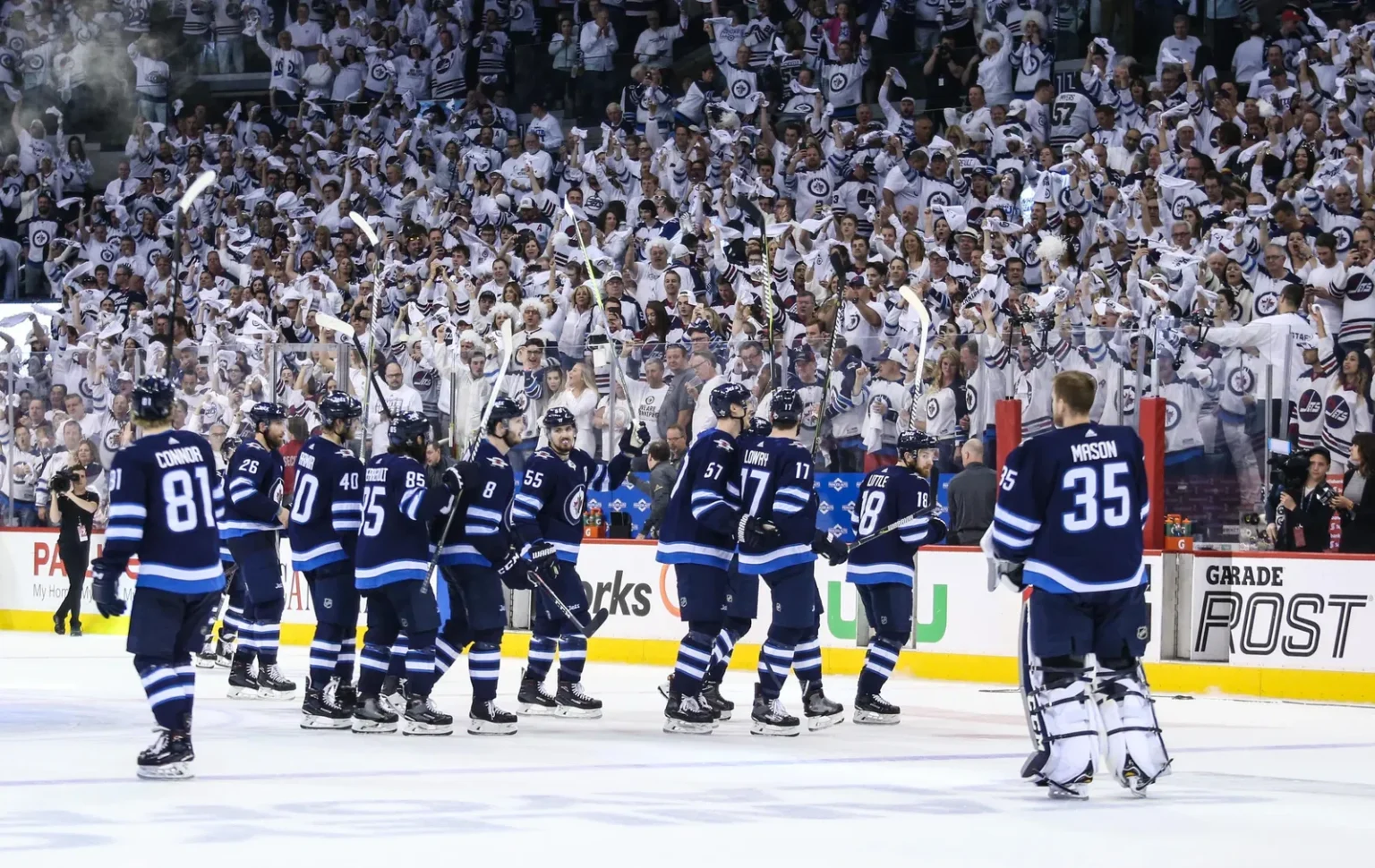The Hockey News has released its archive to all THN subscribers: 76 years of history, stories, and features.
Subscribe now to view the full THN Archives here
Also, go to thn.com/free to subscribe.
Return Of The Jets – Aug. 1 2011 – 2011-12 Yearbook – Tim Campbell
It’s a tale of two cities – one a seller in 1995 and the other a buyer in 2011.
They are both Winnipeg.
The announcement of the NHL’s return to the Manitoba capital, giving Canada a seventh franchise for the 2011-12 season, came 5,510 dark days after the Winnipeg Jets were punted from the Stanley Cup playoffs in 1996. The hit to civic pride and to community confidence was no small thing when the team, sold to American businessmen Richard Burke and Steven Gluckstern, packed up and moved to Phoenix 15 years ago.
The second-guessers still have a field day with it, but that outcome was unavoidable despite the groundswell of everyman support in the critical hours that preceded the lame-duck season of 1995-96. Kids and families broke open their piggybanks. Good ol’ Manitoba socials collected up the coins and bills. An estimated 35,000 fans rallied one day at The Forks. Pass-the-hat schemes of all sorts came up with an excess of $10 million to save the team. But the ominous forces were much larger and more powerful than that.
Player salary escalation had begun in the early ’90s. A U.S. dollar then cost more than $1.35 Canadian. The 1950s-era Winnipeg Arena was an outdated facility with no bona fide luxury boxes or revenue upside. Plus, the city-owned rink was run by an organization of bureaucratic middlemen who only served to split revenue and impede any solution.
Winnipeg Could Target Utah's Nick Schmaltz As Ehlers ReplacementRecent reports indicating Utah's interest in potentially trading forward Nick Schmaltz could open interesting window as an emergency option for the Jets.
Under a now-infamous 1991 agreement, city and provincial politicians agreed to cover the team’s losses in return for time to study building a new arena. (The 1991 cost of that arena would have been less than $70 million.) While they kicked the problem down the road, losses soared to near $20 million per season by 1996 and there was simply no public or political will to stomach it any longer.
When two local bids to buy the team fell through – a new building was promised too late by politicians and projected short-term losses were oppressive – there was no Winnipeg entity or individual who stepped up to own the Jets and the team’s largest private partner, Barry Shenkarow, was left with no other option but to sell to outsiders for $64 million.
The genesis of the May 31, 2011 purchase of the Atlanta Thrashers by True North Sports & Entertainment partners Mark Chipman and David Thomson came only three years or so after Phoenix welcomed the Coyotes.
Chipman, one of the dozen or so Winnipeg young-turk businessmen who tried in vain to save the Jets, had acquired the International League’s Minnesota Moose and moved them to Winnipeg to help fill the hockey hole left by the Jets.
After three years of running the Manitoba Moose, Chipman met with then provincial premier and now Canada’s ambassador to the U.S. Gary Doer to probe a course for a much-needed new arena. It took two more years of haggling and rounding up partners and a plan – all of it well below radar – before Chipman rolled out the vision and the deal for what would become the MTS Centre, a $133-million sports and entertainment facility.
Three levels of government contributed just more than $40 million to the downtown project and have long since recouped their investment via taxation on materials, labor and events. The 15,015-seat arena opened in the fall of 2004 and has been a money-maker and top-ranked venue ever since.
Chipman’s deal-making had another important phase, also key to the return-of-the-NHL-story.
In early 2001, behind-the-scenes negotiations to merge the American League and IHL reached a fever and it was during that process that Chipman first engaged NHL commissioner Gary Bettman. Chipman worked regularly but subtly on that line of communication. He was careful not to make any mistakes with the MTS Centre’s construction that would preclude him from an NHL shot.
The arena’s early success and True North’s and Chipman’s style of measured business practice earned an invitation from the NHL’s executive committee to make the case for Winnipeg in January of 2007, along with Houston, Kansas City, Las Vegas and Seattle. True North’s eye on the NHL went from wishful to practical after the NHL’s 2005 collective bargaining agreement with the NHL Players’ Association, one that featured a salary cap system. Combined with a far healthier Canadian dollar, the organization turned its energy to homework and preparation, a strategy that paid off when the Coyotes went into bankruptcy in 2009.
 New Winnipeg Jets Top 10 Prospect Rankings Features Yager, Lambert and MoreThe Hockey News has released its archive to all THN subscribers: 76 years of history, stories, and features.
New Winnipeg Jets Top 10 Prospect Rankings Features Yager, Lambert and MoreThe Hockey News has released its archive to all THN subscribers: 76 years of history, stories, and features.
Winnipeg’s legitimacy as a market was revealed in a Bettman affidavit in the Coyotes case and when that team was on the precipice of relocation in the spring of 2010, Chipman and True North quietly served as Bettman’s backup plan and leverage.
Engaging that process without so much as a press conference, True North earned the NHL’s trust, familiarized itself with franchise deal-making and learned much about converting the hunger for big-league hockey in its own market.
When the Thrashers’ owners could find no local buyer in early 2011, Winnipeg’s True North was more than ready. So were the city’s fans, who gobbled up 13,000 season tickets and 8,000 spots on a waiting list in less than 72 hours. There’s also a wait list for the arena’s 55 suites.
Euphoria always subsides, however, and it’s the long run that will validate the NHL’s first relocation in 14 years.
Game tickets are virtually all sold for the first three seasons and most are for five, so the final piece to the puzzle will be the depth of corporate support in Winnipeg. It has been questioned far and wide, but True North president and CEO and Jim Ludlow believes it’s a too-easy, lazy criticism of a city that’s in far better shape than 15 years ago.
Ludlow cited major changes in Winnipeg in the past seven years, about the span that has seen a stable-yet-vigorous economy stimulate a doubling in long-stagnant real estate prices. “We’ve concentrated on understanding both the macro issues of the NHL and the micro issues of Winnipeg,” Ludlow said. “We’ve spent a lot of time looking at those. Irrespective of what some non-Winnipeg-based experts might speculate, our local experience tells us to be cautiously optimistic and reasonably confident that the community is going to support NHL hockey.
“Our ticket commitments are long-term; our suite commitments are long-term and our corporate sponsorships are long-term. This is no plunge. It’s a well-executed, well-trained-for and calculated move. We’re not jumping off the dock, holding our breath and closing our eyes.”
 NHL Insider Credits Jets' Strong Locker Room for Likely Re-Signing of Connor, LowrySportsnet's Elliotte Friedman notes the Winnipeg Jets has a healthy locker room full of guys that "really like being around each other"
NHL Insider Credits Jets' Strong Locker Room for Likely Re-Signing of Connor, LowrySportsnet's Elliotte Friedman notes the Winnipeg Jets has a healthy locker room full of guys that "really like being around each other"
Read the full article here



